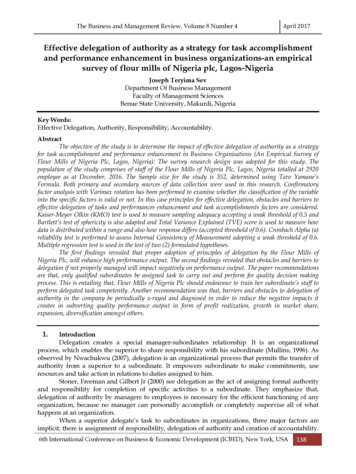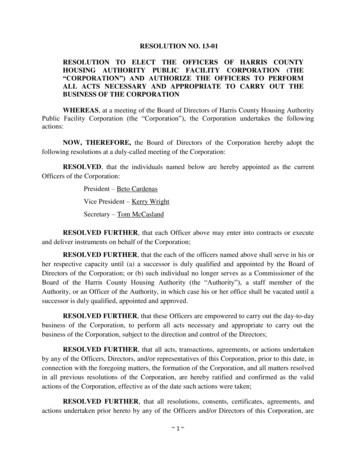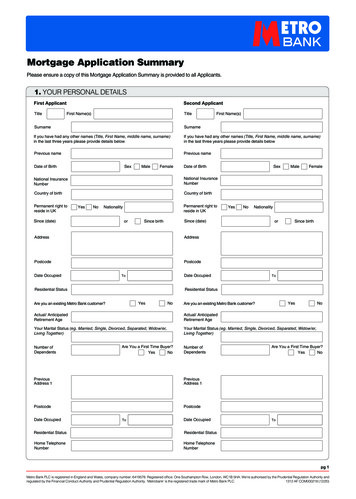
Transcription
The Business and Management Review, Volume 8 Number 4April 2017Effective delegation of authority as a strategy for task accomplishmentand performance enhancement in business organizations-an empiricalsurvey of flour mills of Nigeria plc, Lagos-NigeriaJoseph Teryima SevDepartment Of Business ManagementFaculty of Management SciencesBenue State University, Makurdi, NigeriaKey Words:Effective Delegation, Authority, Responsibility, Accountability.AbstractThe objective of the study is to determine the impact of effective delegation of authority as a strategyfor task accomplishment and performance enhancement in Business Organisations (An Empirical Survey ofFlour Mills of Nigeria Plc, Lagos, Nigeria): The survey research design was adopted for this study. Thepopulation of the study comprises of staff of the Flour Mills of Nigeria Plc, Lagos, Nigeria totalled at 2920employee as at December, 2016. The Sample size for the study is 352, determined using Taro Yamane’sFormula. Both primary and secondary sources of data collection were used in this research. Confirmatoryfactor analysis with Varimax rotation has been performed to examine whether the classification of the variableinto the specific factors is valid or not. In this case principles for effective delegation, obstacles and barriers toeffective delegation of tasks and performances enhancement and task accomplishments factors are considered.Kaiser-Meyer Olkin (KMO) test is used to measure sampling adequacy accepting a weak threshold of 0.5 andBartlett’s test of sphericity is also adapted and Total Variance Explained (TVE) score is used to measure howdata is distributed within a range and also how response differs (accepted threshold of 0.6). Cronbach Alpha (α)reliability test is performed to assess Internal Consistency of Measurement adopting a weak threshold of 0.6.Multiple regression test is used in the test of two (2) formulated hypotheses.The first findings revealed that proper adoption of principles of delegation by the Flour Mills ofNigeria Plc, will enhance high performance output. The second findings revealed that obstacles and barriers todelegation if not properly managed will impact negatively on performance output. The paper recommendationsare that, only qualified subordinates be assigned task to carry out and perform for quality decision makingprocess. This is entailing that, Flour Mills of Nigeria Plc should endeavour to train her subordinate’s staff toperform delegated task competently. Another recommendation was that, barriers and obstacles to delegation ofauthority in the company be periodically x-rayed and diagnosed in order to reduce the negative impacts itcreates in subverting quality performance output in form of profit realization, growth in market share,expansion, diversification amongst others.1.IntroductionDelegation creates a special manager-subordinates relationship. It is an organizationalprocess, which enables the superior to share responsibility with his subordinate (Mullins, 1996). Asobserved by Nwachukwu (2007), delegation is an organizational process that permits the transfer ofauthority from a superior to a subordinate. It empowers subordinate to make commitments, useresources and take action in relations to duties assigned to him.Stoner, Freeman and Gilbert Jr (2000) see delegation as the act of assigning formal authorityand responsibility for completion of specific activities to a subordinate. They emphasize that,delegation of authority by managers to employees is necessary for the efficient functioning of anyorganization, because no manager can personally accomplish or completely supervise all of whathappens at an organization.When a superior delegate’s task to subordinates in organizations, three major factors areimplicit; there is assignment of responsibility, delegation of authority and creation of accountability.6th International Conference on Business & Economic Development (ICBED), New York, USA138
The Business and Management Review, Volume 8 Number 4April 2017This is to say that, it is not practical to delegate one without the other. Effective delegation helpsmanagers to spend less time on specified technical activities or routine decision making andconcentrate their efforts on other strategic management problems.Yalokwu (2006) defines authority as the power to give orders or the right to act or make adecision. It is the right to take action or make a decision that the managers would otherwise havedone. It involves more than just carrying out specified duties according to detailed instructions.Authority legitimizes the exercise of power within the structure and rules of the organization. Itenables the subordinate to issue valid instructions for others to follow. Nwachukwu (2007)emphasized that, one major principle of delegation states that, “for effective delegation, authoritygranted to a subordinate must be equal to the responsibility assigned to him- no more no less”. Thatis, authority delegated to an individual manager should be adequate to assure the ability toaccomplish results expected.Mullins (1986) sees responsibility as an obligation by the subordinate to perform certainduties or make certain decisions and having to accept possible reprimands from the manager forunsatisfactory performance. It is expected that when responsibility is given to a subordinate, he is tohave commensurate authority to discharge it. Failure to equate or balance responsibility withauthority leads to inefficiency. In most Nigerian organization, employee complains of no appropriateauthority to carry out their assigned tasks. Lack of authority deprives employee in this instance fromnecessary cooperation from others.Accountability in the views of Yalokwu (2006) is expectation that people accept credit orblame for results achieved in performing assigned tasks. Management expects employees to reportthe results of the work. This feedback enables management to determine whether effective work isbeing done and whether tasks are being performed properly. A manager cannot check everything anemployee does, so the manager establishes guidelines within which work must be done. Theemployee is accountable for performing within these guidelines. Accountability always flows frombottom up. Accountability is also the point at which authority and responsibility meets.Nwachukwu (2007) maintains that, there is need for “absoluteness of Accountability.” Hecoined it in a principle which stated that, “Although responsibility may be assigned and authoritymay be delegated to subordinates, accountability to one’s superior can neither be assigned nordelegated.” When one delegates one’s assigned responsibility to someone else, one is still fullyaccountable to one’s superior for its execution. When the chief executive officer of an organizationdelegates to the production manager, for instance, and the production manager to his plantsupervisor; if the production quota is not met, the manager director’s accountability to his superiorcannot be delegated or assigned. It is as a result of this that if the organization is not beingproductive, the managing director is replaced while the lower executives keep their positions. Thisprinciple prevents the executive from “passing the buck”, in order to delegate properly, one has toretain a reservoir of authority to ensure that the task is properly carried out. Accountability to one’ssuperior is absolute and not transferable.A superior who refuses to delegate frustrates his subordinates as he denies them the intrinsicand extrinsic satisfaction derived from accomplishing a task. Delegation helps in training employeesto assume responsibility and learn to be accountable for assigned tasks.Koontz and O, Donnell (1976) maintains that, to accomplish effective delegation of tasks byorganization, it is important that the employees (subordinates) understand the purpose of delegatedfunction and the objectives to be achieved. These objectives range from profitability, growth,survival, expansion amongst others. The determination of objectives helps the subordinate to relatethe assigned task to the accomplishment of the overall company objectives and his own personalinterest. There should be clarity of delegation of tasks. As noted by Nwachukwu (2007) the principleof objectives states that, “before initiating any course of action, the objectives in view must be clearlydetermined, understood and stated.” Again the duties assigned must be commensurate with6th International Conference on Business & Economic Development (ICBED), New York, USA139
The Business and Management Review, Volume 8 Number 4April 2017authority delegated. Organization superior that assigned task to subordinates with little authoritygets them easily frustrated and eventually makes them to fail.Additionally, the employees to whom responsibility is to be assigned and authoritydelegated must be judiciously selected. Since not every employee is mentally prepared andcompetent to be assigned task and held accountable. Employee that lack skills, knowledge, andexperience or are poorly motivated should not be selected until they are ready. All these factorsshould be considered by organization who aims at enhancing effective delegation of tasks (Batemanand Snell, 2004).It is pertinent to emphases that, organization that adapts the requisite principle of delegationwill attain her objectives and will be productive. Satisfactory performance record, trends will beestablish by them. The managing director/chief executive officers of organization should emphasizethe adoption of these principles of delegation to facilitate goal attainment by business organization atall times bearing in mind that expected results are determined, tasks are assigned withcommensurate authority needed to accomplish them and holding those to whom these tasks wereassigned accountable for result achieved. Proper alignment of those components will facilitatequality performance by business organizations.2.Statement of the problemDespite the overwhelming importance associated with the practice of delegation of authoritysuch as making subordinates staff to be part of organization decision making process there bysharing their initiatives, skills, specialize knowledge, competence; a mechanism for motivatingsubordinates to be more committed to tasks and implement decisions that they are involved.Additionally, the fulfillment of objective that delegation affords executives of the organization theopportunity to apportion the part of their work responsibilities which they need not do tosubordinates and concentrate on more important areas of their duties and thus serving as a catalystfor providing training aimed at building strengths and overcoming organizational deficiencies. Butstill the same, most business organizations have adopted delegation process are still recording lowperformance trends, low market share. These have constituted a cause of worry to organization, thatdesire to attain high profit, growth, expansion. The researcher therefore seeks to establish why it isso and proffer a way forward to this ugly trend.3.Objectives of the study1. To determine the impact of the principles of delegation of Authority on performanceenhancement in the Flour Mills of Nigeria Plc Lagos.2. To identify the obstacles and barriers militating against effective delegation of Authority inthe Flour Mills of Nigeria Plc Lagos.4.Research questions1. To what extent is the impact of the principles of effective delegation of Authority onperformance enhancement in the Flour Mills of Nigeria Plc Lagos.?2. To what extent are the obstacles and barriers militating against effective delegation ofAuthority in the Flour Mills of Nigeria Plc Lagos.5.Research hypothesesHO1: The principles of effective delegation of Authority have not impacted on performanceenhancement in the Flour Mills of Nigeria Plc Lagos.HO2: There are no obstacles and barriers militating against effective delegation of Authority in theFlour Mills of Nigeria Plc Lagos.6.Review of related literatureDelegation of authority is viewed by Hellriegel (1999) as the process by which managersassigned to subordinates the right to make decisions and act in certain situation. Additionally to6th International Conference on Business & Economic Development (ICBED), New York, USA140
The Business and Management Review, Volume 8 Number 4April 2017assigning a task to a subordinate, the manager also give the subordinate adequate decision makingpower to carry out the task effectively (Dugguh, 2008).Griffins (1997) observed that, delegation is the establishment of a pattern of authority between asuperior and one or more subordinates. Specifically, he defined delegation as the process by whichmanagers assign a portion of their total workload to others. He further emphasize that, the primaryreason for delegation is to enable the manager to get more work done. Subordinates help ease themanager’s burden by doing major portions of the organizations work. In some instances, asubordinate may have more expertise in addressing a particular problem than the manager does. Forexample, the subordinate may have a special training in developing information system or may bemore familiar with a particular product line or geographic area. Delegation also helps developsubordinates. By participating in decision making and problem solving, subordinates learn aboutoverall operations and improve their managerial skills (Wright and Noe, 1996).They delegation process involves three step; Firstly, the manager assigned responsibility or givesthe subordinates a job to do. The assignment of responsibility might range from telling a subordinateto prepare a report to lacing the person in charge of a task force. Secondly, along with theassignment, individual is also given the authority to do the job. The manager may give thesubordinate the power to requisition needed information from confidential files or to direct a groupof other workers. Finally, the manager establishes the subordinate’s accountability that is, thesubordinate accepts an obligation to carry out the task assigned by the manager.Yalokwu (2006) spelt out the principles to be adopted to facilitate effective delegation of tasksand to serve as guide posts for managers to followed and enhance quality performance. Theseinclude;1. Defining Authority and Responsibility: - Here, subordinates should clearly understand thework delegated to them, recognize the scope of their authority and accept their accountability.2. Involve Subordinates: - The challenge of the work itself won’t always encourage subordinatesto accept and perform delegated tasks well. Managers can motivate subordinates by involvingthem in decision making, by keeping them informed, and by helping them improve their skillsand abilities.3. Require Completed Work: - Managers should require that subordinates carry a task through tocompletion. The manager’s job is to provide guidance, help, and information not to carry outthe job.4. Provide Training: - Delegation can be only as effective as the ability of people to perform thework and make the necessary decisions. Managers should continually appraise delegatedresponsibilities and provide training aimed at building on strengths and overcomingdeficiencies.5. Minimize Interference: - Once an executive has delegated authority to his or her subordinatesto make certain decision on task performed, they should resist the temptation of “telling” thedelegated person what, when and how. Of course, if matters turn out to be too complex to behandled by the subordinates, then supervisors must help and guide them, or act themselves ifthe consequences appear to be more far-reaching than what had been thought earlier. As arule, once the authority has been delegated to subordinates to make decisions, they should beallowed to do so ever if their superiors feel that could make better decision themselves (Stoner,Freeman and Gilbert, 2002).6. Tolerate Mistakes: - It is possible that subordinates may at times make sub-optimal or evenwrong decision but if they are subjected to strong disapproval, they may refrain from makingdecisions at all, and adopt the safer course of always asking the boss to do so. This will notonly overburden already busy superiors, but this way subordinates are also never going tolearn to make sound decisions. It does not mean that subordinates should be allowed to makeas many mistakes as they may but rather that minor mistakes should be ignored or tolerated,and serious mistakes turned into learning experience.6th International Conference on Business & Economic Development (ICBED), New York, USA141
The Business and Management Review, Volume 8 Number 47.8.9.10.11.12.13.7.April 2017Establish Adequate Controls: - Since an executive can delegate authority but notresponsibility, it becomes necessary for him or her to establish adequate controls to ensure thathis or her subordinates exercise authority properly and achieve predetermined goals. But itshould be borne in mind that controls should not be so detailed and so frequent as to inhibitsubordinates initiative.Predetermined Goals: - Since the purpose of delegation of authority is to enable thesubordinate to make decision and take appropriate action for job performance, it is essentialthat their jobs should be clearly defined and performance goal established. This will providedirection to the efforts of subordinates and enable the superior to decide the kind and extent ofdelegation. It will also enable superior to “manage by exception’’, and relieve some fromdetailed supervision.Set Policies; Rules and Procedures to Guide Decisions: - One of the problems in delegation isensuring that the subordinates use their delegated authority judiciously and that decisions areconsistent with the broad policies of the organization. The problem can be done by establishingdefinite guidelines for decision making in the form of policies, rules and procedures. These willprovide the subordinates a framework for decision making and serve as standards for testingthe appropriateness of their decisions.Reward Delegation:- In order to encourage executives to delegate adequately and effectively,organizations should establish a policy of rewarding delegation. This can be done by makingdelegation as one of the criteria of performance evaluation. Similarly, subordinates should beencouraged to accept responsibility and take initiative.Follow Unity of Command: - A delegated subordinate should be responsible to only onesuperior delegating the authority to the subordinates in the first place. In this manner, theresponsibility for mistakes as well as accomplishments is traceable and the chances of conflictsor confusion are minimal.Communicate Effectively: - According to Drucker (1989), the lines of communication must becontinuously kept open for issuing directives as well as for receiving feedback. Accordingly,both responsibility and authority must be clearly defined, openly communicated and properlyunderstood. A misunderstood responsibility can be very dangerous. A general authority canbe easily misused.Principle of Management by Exception:Management should delegate the authority and responsibility of routine operations anddecision making to subordinates, but must retain such tasks for themselves for which theyalone are unequally qualified.On the other hand, subordinates must make decisions and take actions whenever they canand should only refer to their superiors matters of such nature that are unique and outsidetheir domain of authority. Such practice saves top management valuable time that can be usedfor more important policy matters.Stoner, Freeman and Gilbert Jnr (2000) emphasized the following as guidelines to befollowed for effective delegation of task by superiors. They include;a) Firstly deciding on which tasks that can be delegated.b) Deciding who should get the assignment.c) Provide sufficient resources for carrying out the delegated task (i.e financial, humanand material/physical resources).d) Delegate the assignment.e) Be prepared to run interference, if necessary.f) Establish a feedback system.Obstacles to effective delegation6th International Conference on Business & Economic Development (ICBED), New York, USA142
The Business and Management Review, Volume 8 Number 4April 2017Despite the laudable objectives of delegation which according to Mooney (1949) include thefollowing;i. Affording executives the opportunity to apportion the part of the work, which they need not do,to subordinates, so that they can devote their time to more important areas of their duties.ii. Allowing subordinates to take on more responsibilities and develop themselves for higherpositions.iii. Making it possible to push decision making to lower level where the pertinent information,competence and willingness to make decisions may be available, therefore helps to devolvepower down the management hierarchy.iv. Delegation been used as a mechanism for motivating subordinates; Managers often do notdelegate adequately and effectively. Yalokwu (2006) enumerated reasons of inadequatedelegation to lie not in the attitudes of the superiors but also of the subordinates. These arehighlighted below;a)Superior-related reasons of inadequate delegationI. Belief, that they can make better decisions: - Some managers are reluctant to delegate becauseof their belief that they can make better decisions than their subordinates. This belief isoften found especially among managers who have been recently promoted from a lowerposition. In this case, they end up doing subordinates works to the neglect of their own.Subordinates will end up been under worked resulting to lose of initiative, and havinglittle to contribute, if any, commitment to implement decisions. They are also never goingto learn to make good decisions and take responsibility, Sev (2013).II. Fear of Losing Importance: - Some managers like the comfortable feeling of authority andfear that if they delegate authority, it will diminish their importance. This fear can befallacious and misleading. In delegating, a manager transfer to his or her subordinates onlythat part of their authority that relates to carrying out jobs responsibilities. This does affectauthority that is predicated on their management position.III. Fear of Loss Control: - Some managers are often apprehensive about losing control bydelegating authority to their subordinates. They seem to think that as they are responsibleto their own superiors for the subordinates job performance that if they delegate authorityto their subordinates, they would not be sure of the results produced. This fear is genuinein the case of managers who are incapable or unwilling to establish proper controls toensure that subordinates are performing satisfactorily and achieving the desire results. Theproper aim of delegation should be to that, manager’s watch and guide subordinatesperformance through proper control mechanisms but not be afraid to delegate.IV. Fear of being exposed: - Some managers are reluctant to delegate as they fear it will exposetheir own shortcomings to set goals, define tasks of subordinates, specify their respectiveboundaries of authority and coordinate their activities. They should better realize thatkeeping everything to themselves is no solution to such personal problems. They can learnto delegate by delegating just as subordinates learn to use authority by exercising it.Mistakes are likely to occur on both sides but mistakes are learning experiences (Trenthaand Newport, 1976).V. Unwillingness to take calculated Risk: - Delegation involves certain risk that subordinatesmay not make sound decisions. Every decision involves some element of risk as the resultsof decision lie in the future. In theory, managers who are unwilling to take risk will neverbe able to make any decision Managers can reduce the risks of delegation by relating jobassignments and delegating authority carefully with their subordinates abilities andmotivation and by establishing adequate control mechanisms to ensure qualityperformance.6th International Conference on Business & Economic Development (ICBED), New York, USA143
The Business and Management Review, Volume 8 Number 4April 2017VI. Tendency to be Authoritarian: - Managers often fail to delegate because of their authoritarianleadership style. They believe in making decisions themselves, giving detailed instructionsof their subordinates and exercising close supervision. This makes them to beoverburdened to the extent that, they never find enough time to devote to theirresponsibilities of planning and organizing. This usually cause low job satisfaction, lowmorale and alienation among their subordinates.VII. Environment of mutual Mistrust: - An organization that is saturated with high element ofmistrust and distrust, managers are often reluctant to delegate. Delegation requiresmanagers to have self-confidence in their own abilities to help, guide and control theirsubordinates, as well as build confidence in their abilities to exercise authority, judiciously,make sound decisions and achieve the desired goals.b).1)2)3)4)5)Subordinate-related factorsSometimes delegation suffers because of subordinate’s lack of self-confidence andwillingness to take responsibility and initiative. McFarland, (1974) identified the followingfactors;Lack of self-confidence in their Abilities: - Subordinates are often unwilling to accept or usedelegated authority because they lack self-confidence in their abilities. It is thus for the superiorto build their self-confidence by helping and guiding them and also by creating a supportiveenvironment.Fear of making mistakes: - Some subordinate are often afraid of making mistakes. Thisparticularly happens when their superiors are either looking for mistakes or turn every mistakeinto an occasion for reprimanding them. Mistakes are indeed all in the game and should beused as a learning experience; the manager must accept that errors will be made as part of theprocess of learning.Dependent Personality: - Subordinate who have low need for autonomy feel comfortable in therelationship of dependence with their superiors. They feel confused and a sense of loss ofdirection if they are entrusted with authority that requires them to make decisions. Suchsubordinates will have to be trained and developed to learn to be independent through gradualnot so demanding delegation accompanied with guidance and support.Unclear Delegation: - Subordinates feel reluctant to accept authority when delegation is soboard that they do not know what precisely they are expected to do and how much authoritythey can use for making decisions. Delegation to be effective should be specific without beingrigid.Lack of motivation: - Some subordinates feel lack of motivation to take responsibility and acceptauthority. This happens particularly when rewards like recognition, pay increases, promotionetc, are not linked with performance. Delegation will be successful only when subordinatesperceive that by accepting responsibility and authority they will be advancing toward thesatisfaction of their needs. (Maslow, 1943; Herzberg, 1996), Soelistya, Mashud and Suryanto(2016), Mullins (1996) and Yalokwu (2006) still emphasized that despite the above mentionedobstacles, authority has to be delegated in all kinds of organizations. It is only throughdelegation that managers enable subordinates to do part of the former’s job.8.Methodological frameworkThe research design adopted for this study is survey research design hence it placespremium on simple survey. The population of the study consisted of staff of Flour Mills of NigeriaPlc, Lagos totaled at 2920 as at 31st December, 2016. The sources of the information for this researchare both primary and secondary sources. To scientifically generate a sample size, the Yamane’sformula (1964) was applied.According to Baridam (2001), this formula can be used for a homogeneous population like the onein the study. The formula is stated below;6th International Conference on Business & Economic Development (ICBED), New York, USA144
The Business and Management Review, Volume 8 Number 4WhereApril 2017 Sample sizee level of significanceN Population size1 Constant valueThe total population size of 2920 obtained from Flour Mills of Nigeria Plc, Lagos under study at 0.05level of significance is shown below;To ascertaining the validity and reliability of the measuring instruments for the research,factor analysis was applied in determine the construct validity, while Cronbach Alpha is used todetermine the reliability of the instruments. Pilot test was conducted and the input variable factorsused in the study were subjected to exploratory factor analysis to investigate whether the constructas described fits the factor analysis. Bartlett’s test of sphericity and Kaiser- Meyer- Olkin measure ofsampling adequacy are applied in determining the construct validity.For reliability of research instrument, it measures the consistency or precision of themeasure. Gay (1996), states that reliability means dependability or trustworthiness and that anyreliable measures yields the same results anytime it is administered. Cronbach Alpha was used indetermining the reliability of the instruments in the pilot test as shown ationK.M.O. 0.982Sig 0.00(TVE) 0.525CronbachAlpha() 0.868Bartlett’s testof SphericityApprox. Chisquare 6134.58Df 78(Items)Loading1) Effective delegation involves proper defining ofauthority and responsibility.2) Effective delegation requires involvingsubordinates by motivating them.3) Effective delegation requires that subordinatescarryout the task through to completion withguidance from managers.4) Proper training to subordinates aimed atbuilding on strengths and overcomingdeficiencies in them after appraisal is necessary.5) The executive of the organization shouldmi
The Business and Management Review, Volume 8 Number 4 April 2017 6th International Conference on Business & Econ omic Development (ICBED), New York, USA 138 Effective delegation of authority as a strategy for task accomplishment and performance enhancement in business organizations-an empi










